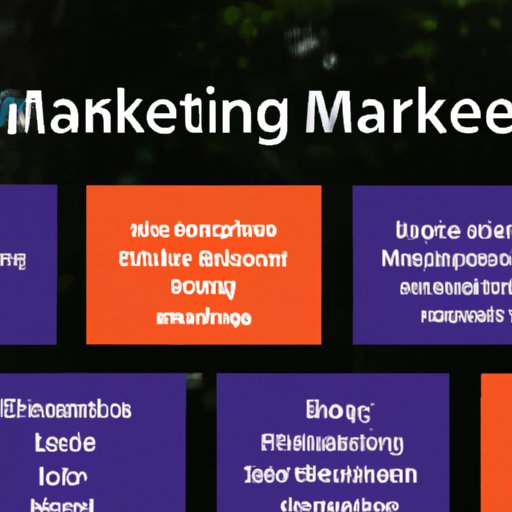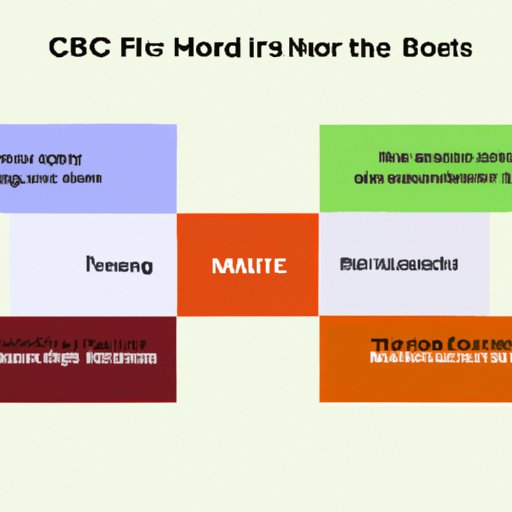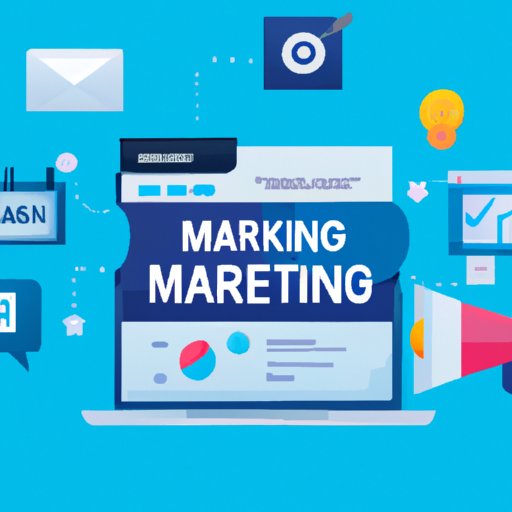Introduction
One of the most important aspects of running a business is understanding the different types of marketing strategies and how they can be used to effectively reach your target audience. With the advent of digital technology, businesses now have access to a variety of digital marketing strategies that can help them increase their visibility, gain customers, and boost sales. In this article, we’ll explore the five most effective digital marketing strategies, including social media, content marketing, search engine optimization (SEO), email marketing, and paid advertising.
Analyzing the 5 Most Effective Digital Marketing Strategies
Let’s take a closer look at each of these five strategies in more detail.
Social Media Strategies
Social media has become an indispensable tool for businesses of all sizes. By creating profiles on popular platforms such as Facebook, Twitter, and Instagram, businesses can connect with their target audiences in real-time, share valuable information, engage in conversations, and promote their products and services. Additionally, businesses can use social media to gain insights into their customers’ preferences and interests, which can help them tailor their marketing campaigns accordingly.
Content Marketing Strategies
Content marketing is all about producing high-quality content that is both informative and engaging. This content can come in many forms, including blog posts, articles, videos, infographics, podcasts, and ebooks, and should be tailored to the needs of your target audience. Content marketing can help businesses establish themselves as thought leaders in their respective industries, build relationships with their customers, and generate leads.
Search Engine Optimization (SEO) Strategies
Search engine optimization (SEO) is the process of optimizing web pages to ensure they are visible in organic search engine results. This involves researching relevant keywords and phrases, optimizing page titles and descriptions, and creating quality backlinks. By implementing SEO best practices, businesses can improve their rankings in search engine results, attract more visitors to their website, and ultimately drive more sales.
Email Marketing Strategies
Email marketing is a powerful way to nurture leads and convert them into paying customers. Through personalized emails, businesses can stay top-of-mind with their audience, keep them updated on new products and services, and encourage them to take action. Additionally, email marketing is cost-effective and can be easily tracked and analyzed, allowing businesses to measure the success of their campaigns.
Paid Advertising Strategies
Paid advertising is another effective way to reach potential customers. Businesses can choose from various platforms such as Google Ads, Facebook Ads, and Instagram Ads, depending on their goals and budget. Paid advertising is a great way to quickly drive traffic to your website and generate leads, but it can also be expensive if not managed properly.
How to Develop and Implement a Winning Marketing Strategy
Now that we’ve explored the five most effective digital marketing strategies, let’s take a look at how you can develop and implement a winning marketing strategy. The key steps are:
Establishing Goals and Objectives
The first step in developing a successful marketing strategy is establishing your goals and objectives. What do you want to achieve with your campaign? Do you want to increase brand awareness, drive website traffic, or generate leads? Having clear goals and objectives will help you determine which strategies and tactics will be most effective for achieving your desired outcomes.
Identifying Your Target Audience
You also need to identify your target audience. Who are they? What do they care about? Understanding your target audience will help you create content and messages that resonate with them and make them more likely to take action.
Researching Your Competitors
It’s also important to research your competitors. What strategies are they using? What kind of content are they creating? Knowing what your competitors are doing can help you create a better marketing strategy and stand out from the crowd.
Creating an Action Plan
Once you’ve established your goals and objectives, identified your target audience, and researched your competitors, it’s time to create an action plan. This plan should include the tactics and channels you’ll use to reach your target audience, as well as specific metrics for measuring success. This plan should also include deadlines for when certain tasks should be completed.

Exploring the 5 Key Elements of an Effective Marketing Plan
In order to create an effective marketing plan, there are five key elements you need to consider: setting goals, identifying your target audience, developing a budget, crafting your message, and selecting the right channels.
Setting Goals
As previously mentioned, it’s important to clearly define your goals and objectives. This will help you focus your efforts and measure the success of your marketing efforts.
Identifying Your Target Audience
Knowing who your target audience is and what they care about will help you create content and messages that will resonate with them.
Developing a Budget
Creating a budget is essential for any marketing strategy. You need to determine how much money you’re willing to spend on each tactic and channel, as well as how much you’re willing to allocate to each goal.
Crafting Your Message
Your message is the cornerstone of your marketing strategy. It should be clear, concise, and compelling. It should also be tailored to your target audience.
Selecting the Right Channels
Finally, you need to decide which channels you’re going to use to reach your target audience. Different channels may be more effective for different goals, so you need to choose wisely.
The Benefits of Using 5 Different Types of Marketing Strategies
Using multiple types of marketing strategies can bring a number of benefits to your business, including:
Increased Brand Awareness
Implementing multiple marketing strategies can help you reach more people and increase your brand awareness. This can help you gain more customers and boost sales.
Improved Customer Loyalty
By regularly engaging with your customers through various channels, you can build relationships with them and improve customer loyalty. This can lead to repeat purchases and higher customer lifetime value.
Increased Traffic
Using multiple marketing strategies can help you drive more traffic to your website, which can result in more leads and conversions.
Enhanced Lead Generation
By targeting the right people with the right message, you can increase your lead generation efforts and capture more qualified leads.
Improved Conversion Rates
By optimizing your website and creating targeted campaigns, you can improve your conversion rates and generate more revenue.

Understanding the Pros and Cons of the 5 Core Marketing Strategies
Each of the five core marketing strategies has its own advantages and disadvantages, which you should consider before deciding which one is right for your business.
Social Media
Pros: Social media is a great way to connect with your target audience in real-time, build relationships with them, and increase brand awareness. It’s also relatively inexpensive and easy to track and analyze.
Cons: Social media can be time-consuming and requires a lot of effort to maintain. Additionally, it can be difficult to stand out from the competition on social media.
Content Marketing
Pros: Content marketing is an effective way to establish yourself as a thought leader in your industry, build relationships with your customers, and generate leads. It’s also relatively inexpensive and can be easily tracked and analyzed.
Cons: Content marketing requires a lot of time and effort to create high-quality content that resonates with your target audience.
SEO
Pros: SEO is a great way to improve your visibility in search engine results and drive more traffic to your website. It’s also relatively inexpensive compared to other marketing strategies.
Cons: SEO requires a lot of time and effort and can be difficult to master. Additionally, it can take a while to see results.
Email Marketing
Pros: Email marketing is a great way to nurture leads and convert them into paying customers. It’s also relatively inexpensive and can be easily tracked and analyzed.
Cons: Email marketing can be time-consuming, and it can be difficult to stand out in crowded inboxes.
Paid Advertising
Pros: Paid advertising is a great way to quickly drive traffic to your website and generate leads. It’s also relatively inexpensive and can be easily tracked and analyzed.
Cons: Paid advertising can be expensive if not managed properly, and it can be difficult to stand out from the competition.

What Every Business Needs to Know About the 5 Basic Marketing Strategies
When it comes to creating a successful marketing strategy, there are a few key things every business needs to know:
Knowing Your Audience
Understanding your target audience is crucial for creating an effective marketing strategy. Knowing who they are and what they care about will help you create content and messages that resonate with them.
Establishing a Budget
Creating a budget is essential for any marketing strategy. You need to determine how much money you’re willing to spend on each tactic and channel, as well as how much you’re willing to allocate to each goal.
Utilizing Multiple Channels
Using multiple channels can help you reach more people and increase your chances of success. Each channel has its own advantages and disadvantages, so you need to choose wisely.
Measuring Success
It’s important to set specific metrics for measuring the success of your marketing efforts. This will help you track your progress and make adjustments as needed.
Learning from Mistakes
No marketing strategy is perfect. It’s important to analyze your campaigns, identify areas for improvement, and adjust your strategy accordingly.
Conclusion
Understanding the five most effective digital marketing strategies is essential for any business. Social media, content marketing, SEO, email marketing, and paid advertising can all be used to reach your target audience, increase brand awareness, and boost sales. But it’s important to remember that these strategies require time, effort, and knowledge to be successful. By following the tips outlined in this article, you can create an effective marketing strategy that will help you achieve your goals.
(Note: Is this article not meeting your expectations? Do you have knowledge or insights to share? Unlock new opportunities and expand your reach by joining our authors team. Click Registration to join us and share your expertise with our readers.)
